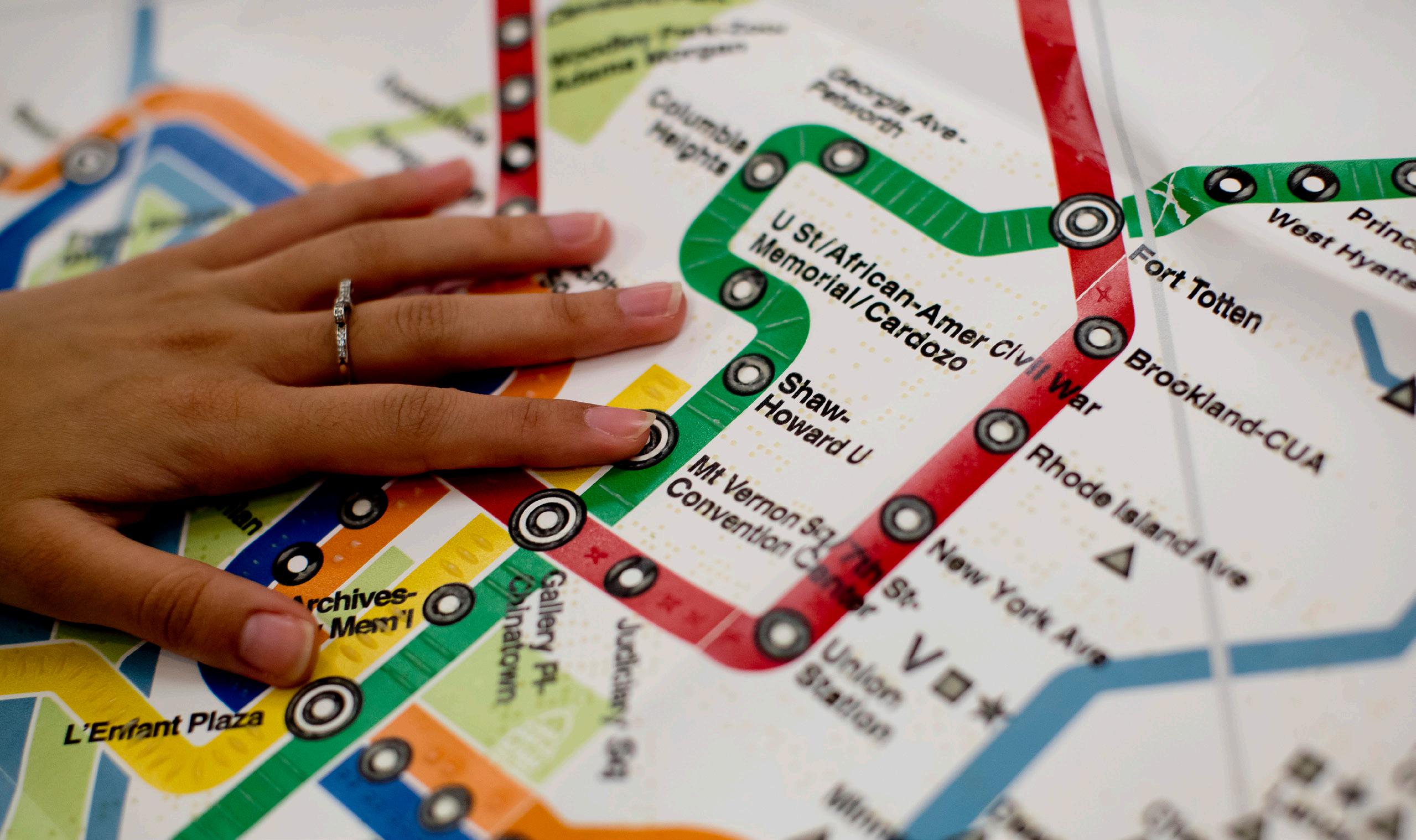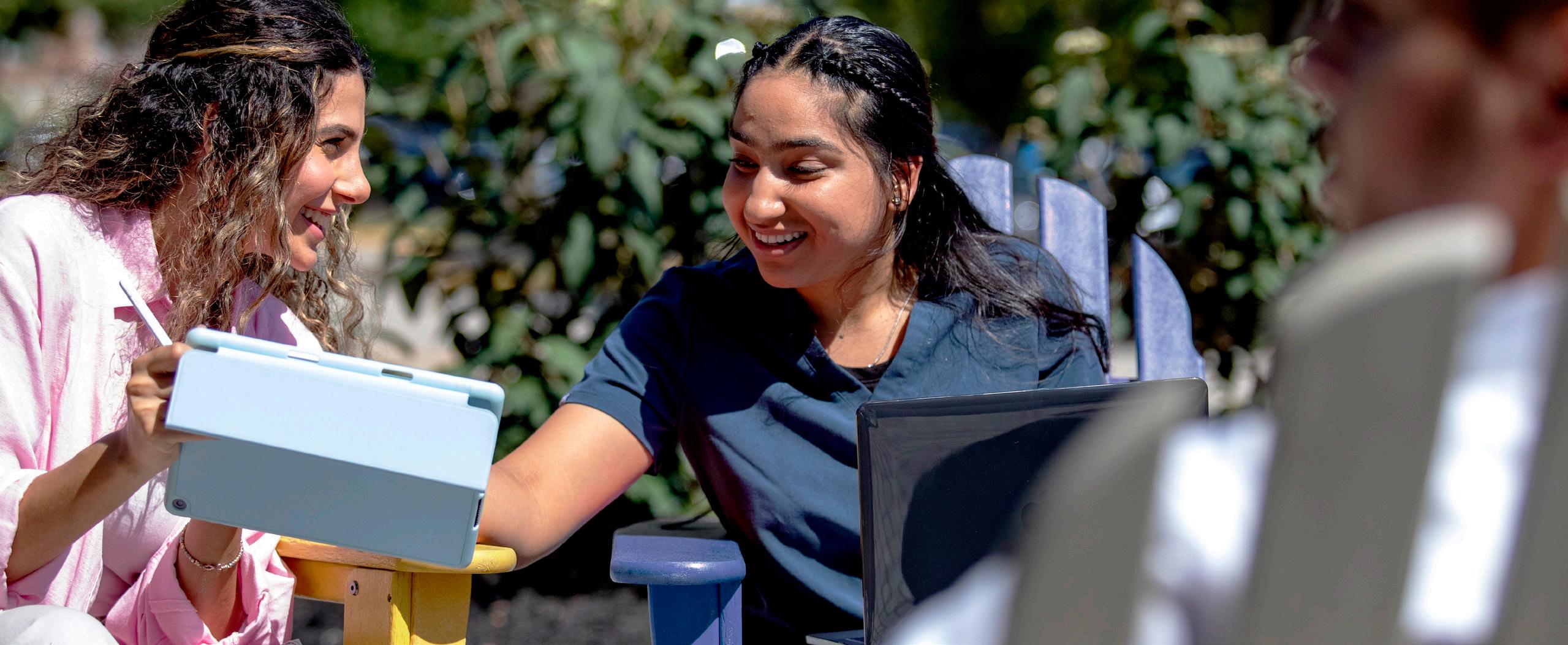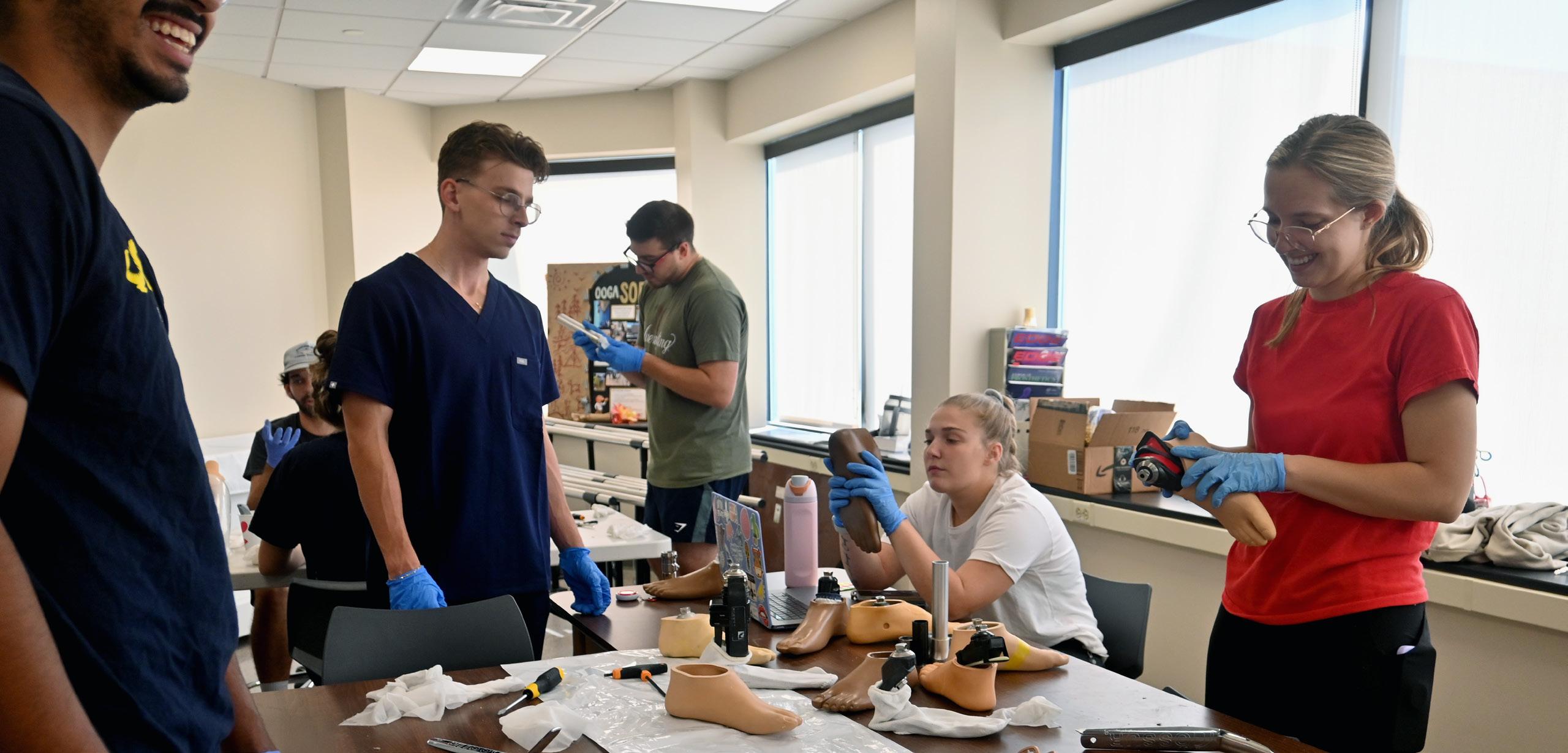

Low Vision Rehabilitation
The Department of Blindness and Low Vision Studies offers a Master of Science (MS) degree and Certificate Program in Low Vision Rehabilitation (LVR).
Why Drexel?
• The interdisciplinary programs in the Blindness and Low Vision Studies department prepare professionals to work effectively in clinical rehabilitation and educational settings with people of all ages who have low vision. Emphasis is placed on a team approach to implementing low vision assessments and interventions.
• The Low Vision Rehabilitation coursework and supervised fieldwork experience satisfy the requirements for certification by the Academy for the Certification of Vision Rehabilitation and Education Professionals (ACVREP).
• The LVR program offers full-time and part-time options, and the majority of the curriculum is taught online, with a summer residency on campus, and an internship.
ADMISSIONS CHECKLIST
Complete an application at GradCAS.
Complete a bachelor’s degree.
Submit a CV/Resume.
Write a Statement of Purpose.
Submit three letters of recommendation.
Career Description
• Educate people who have low vision and their caregivers, teachers and others on ways to maximize vision.
• Implement strategies to make environments and materials more accessible for people who have low vision.
• Help individuals who have lost vision to see again using accommodations and adaptations.

Career Advantages
• Every day is different, interesting, and challenging.
• Rewarding career working one-on-one.
• Positions available internationally.
Work Environments
• Low vision clinics at sites.
• Eye care professional practices.
• Hospitals and rehabilitation centers.
• Home care.
• All schools.


Teacher of Students with Vision Impairments
The Department of Blindness and Low Vision Studies offers a Master of Education (MEd) in Blindness and Vision Impairments degree and a Certificate for Teacher of Students with Vision Impairments.
Why Drexel?
• These competency-based programs offer coursework and practical experiences that develop the necessary knowledge and skills required for the instruction of infants, children and youth who are blind or visually impaired, and those with multiple disabilities.
• The program is aligned with standards set forth by the Pennsylvania Department of Education and the Council for Exceptional Children’s Division of Visual Impairment and Deafblindness.
• Programs are offered for part-and full-time study, with coursework primarily online during the fall and spring terms, a four-week summer residency on campus for two summers, and an internship.
ADMISSIONS CHECKLIST
Complete an application at GradCAS.
Complete a bachelor’s degree.
Submit a CV/Resume.
Write a Statement of Purpose.
Submit three letters of recommendation.
Submit a copy of your teaching certificate.
Career Description
• Serve as the educational team’s expert on blindness and visual impairment.
• Collaborate with and learn from families and other professionals to increase student independence.
• Incorporate the use of braille, assistive technology and other communication modes within instruction.
• Teach students how to advocate for their needs and accommodations.
• Prepare students for college and competitive employment.

Work Environments
• Private and public schools.
• Schools for the blind and visually impaired.
• Student group homes.
• Government agencies.
• Universities.
Career Advantages
• Learn the braille code.
• Tuition grants and stipends are often available.
• Work according to the academic calendar.
• Teach one-on-one or teach a class of students.
• Employment often secured before graduation.


For more information, the Office of Graduate Admissions welcomes inquiries by prospective students. Call 1.800.2.DREXEL or visit Drexel.edu/ElkinsPark/Admissions
Orientation and Mobility
The Department of Blindness and Low Vision Studies offers both Master of Science (MS) degree and a Certificate Program in Orientation and Mobility (O&M).
Why Drexel?
• Prepares O&M specialists with the knowledge and skills needed to teach those with blindness or vision impairments skills to remain oriented in their environment and mobility skills to be independent within their environments.
• The O&M program offers full-time and parttime options, and the majority of the curriculum is taught online, with a summer residency and one additional week in the fall on campus, and culminates with an internship.
• Students are prepared for the requirements for the national certification by the Academy for Certification of Vision Rehabilitation and Education Professionals (ACVREP).

ADMISSIONS CHECKLIST
Complete an application at GradCAS.
Complete a bachelor’s degree.
Submit a CV/Resume.
Write a Statement of Purpose.
Submit three letters of recommendation.
For specific details on the above admissions requirements and deadlines, visit Drexel.edu/ElkinsPark/Admissions
Career Description
Individualized instruction includes effective use of remaining senses, concept development, orientation skills, problem-solving skills, use of a long cane or other mobility systems, instruction in the use of optical and/or electronic devices, and travel in a variety of settings including the use of public transportation when appropriate.
Work Environments
• Rehabilitation agencies.
• Veterans Administration Medical Centers.
• Schools including public, private and schools for the blind/visually impaired.
• State organizations for the visually impaired.
Career Advantages
• Every day is dynamic, different and challenging.
• Grants and/or stipends for tuition are often available.
Certification Requirements are available at ACVREP.org.
Gainful employment data for graduates of certificate programs can be found at Drexel.edu/ElkinsPark/Gainful-Employment.


Osborne Audiology at Drexel University, Elkins Park Campus, offers distance education and international degree programs with online education for working audiologists.
Distance Education Programs
AuD Degree (Bridge) Program
The primary goal of this program is to prepare practicing audiologists in the U.S. and other countries to gain a professional doctorate degree in Audiology (AuD) by giving them the opportunity to enhance their professional and clinical capabilities and stay abreast of advances in theoretical, diagnostic and rehabilitation issues in auditory science and audiology.
The AuD Bridge Program is designed to enhance the students’ current level of experience in various areas of audiology, while focusing on the core competencies in the areas of Biomedical Sciences, Diagnostic Sciences, and Remedial Sciences and Professional Issues. These core competencies are based upon Osborne Audiology’s core philosophy in preparing an audiologist to compete in today’s dynamic and competitive health care services.
International MSc in Clinical Audiology Program
The primary goal of the program is to offer international audiology practitioners the chance to advance their knowledge and skills in audiologic care and to experience specialized fellowship training within a specific content area. This degree program features biomedical and audiologic sciences, clinical sciences, research design and application, and small group learning experiences, delivered in 51 semester hour credits over a 24-month period. This is a hybrid program with both face-to-face learning supplemented by online content, handson workshops and supervised clinical training.
Advanced Studies Certificate Programs
Taught entirely online, the Advanced Studies Certificate Programs prepare audiologists to become experts in a specialized area. Each curriculum is designed to expand students’ knowledge, provide needed skills and expertise, build confidence in the delivery of clinical services and present the latest on the state-of science in each specialty area’s technology and treatment, with special emphasis on current research and evidence.
CERTIFICATE PROGRAMS
• Advanced Studies Cochlear Implants.
• Advanced Studies Vestibular Sciences and Disorders.
• Advanced Studies Tinnitus and Hyperacusis.
Osborne Audiology Core Philosophy
Biomedical Sciences & Auditory Neuroscience
Clinical Audiology & Diagnostic Services
Evidence-Based Practice (EBP)
Clinical Audiology & Rehabilitation Services
Public Health & Professional Issues

Behavioral Assessment
Behavioral Intervention Objective Assessment
Technological Intervention
Osborne


Drexel University, Elkins Park Campus, is proud to offer a Post-baccalaureate Program in Health Sciences which will help develop each student’s scientific skills and foundational knowledge in basic health sciences while also exposing them to patient care experiences in a variety of settings and disciplines.
Post-baccalaureate in Health Sciences
Certificate Program
Why Drexel?
• Graduate-level courses designed to strengthen students’ background in health sciences.
• Faculty and staff dedicated to the education of health care professionals.
• Assigned a profession-specific mentor who helps the student appreciate the profession they seek, the education involved to obtain a degree in the career and the process of applying to professional school.
• Development of academic skills in preparation for a graduate or professional health science degree.
• Development of scientific skills for a foundation in health sciences.
• Clinical and patient observation in The Eye Institute, the Pennsylvania Ear Institute, and the SpeechLanguage Institute of Drexel University.*
• Career and academic guidance for future professional success.
• Ability to take classes à la carte.
*Only students enrolled full-time are eligible for patient observation
ADMISSIONS CHECKLIST
Complete an application at PostbacCAS.
Complete a bachelor’s degree from an accredited institution.
Submit official undergraduate transcripts.
Submit two short-answer essays (250 words maximum.)
Submit a CV/Resume.
Submit one letter of recommendation.
For specific details on the above admissions requirements and deadlines, visit Drexel.edu/ElkinsPark/Admissions
What is a Post-baccalaureate?
Post-baccalaureate programs are for students who have already completed an undergraduate degree or are working toward a secondary degree from an accredited institution.
According to U.S. News and World Report, benefits to completing a Post-baccalaureate program are many: it can provide an opportunity to take required prerequisite courses after undergraduate graduation, boost a competitive GPA or help students become better prepared for admission to a professional, graduate or medical school.

About Drexel University, Elkins Park Campus
• Commitment to interprofessional education and interdisciplinary training.
• Primary care philosophy and holistic approach assesses the whole patient for prevention, treatment and rehabilitation.
• Exceptional clinical training sequence that begins early and includes externships and fieldwork in a variety of health care delivery settings.
• Innovative learning strategies that include small group, interactive and self-directed learning experiences as well as clinical problem-solving.
• Integration of cutting-edge technologies to prepare students for ever-evolving professions.
• Commitment to the ongoing professional and personal development and the success of each student.


Drexel University, Elkins Park Campus, offers a 34-month, Master of Science in Orthotics & Prosthetics (O&P) degree program, designed to give students the foundational knowledge, technical skills, and clinical abilities to excel in the orthotist and prosthetist profession.
Orthotics & Prosthetics
Master of Science
Why Drexel?
• A profession that combines problem-solving, creative design, and patient care in a market that demands O&P services.
• Curriculum constructed from a holistic perspective with cultural humility and belonging at its core.
• State-of-the-art clinical lab facility with dedicated training and learning spaces.
• Learn in closely knit cohorts alongside skilled faculty who are board-certified prosthetistorthotists and leaders in the field.
• lnterprofessional education opportunities with other Drexel University, Elkins Park Campus, degree programs.
• An integrated 18-month clinical residency will enable graduates to sit for the National ABC Board exams in both Orthotic and Prosthetic disciplines.
ADMISSIONS CHECKLIST
Complete an application at OPCAS.
Complete a bachelor’s degree (minimum overall GPA of 3.0 recommended.)
Complete the prerequisite coursework with a grade of C or higher.
Submit two letters of recommendation.
Shadow a licensed orthotistprosthetist(s) for a minimum of 40 hours (50 hours of fabrication experience recommended but not required.)
For specific details on the above admissions requirements and deadlines, visit Drexel.edu/ElkinsPark/Admissions
#16 on U.S. News and World Report’s Best Health Care Jobs
What Orthotists and Prosthetists Do
Orthotists and prosthetists design and fabricate medical supportive devices and measure and fit patients for them.
Work Environment
Orthotists and prosthetists work in various industries, including manufacturing, health and personal care stores, doctors’ offices, and hospitals. Most work full time.

Education
Orthotists and prosthetists need a master’s degree and certification. Both orthotists and prosthetists must complete a residency before they can be certified.
Median Salary
$78,100 per year
Job Outlook
15% projected growth
source: bls.gov
Drexel University is accredited by the Middle States Commission on Higher Education (MSCHE). For program specific information about accreditation, visit Drexel.edu/ElkinsPark/Accreditation
The Master of Science in Orthotics & Prosthetics degree program is accredited by the Commission on Accreditation of Allied Health Education Programs (www.caahep.org) upon the recommendation of the National Commission on Orthotic and Prosthetic Education (NCOPE). The next evaluation of the program is scheduled to occur no later than 2029.
National Commission on Orthotic and Prosthetic Education 330 John Carlyle St., Suite 200, Alexandria, VA 22314, Tel: 703.836.7114


The Post-baccalaureate program in Speech-Language Pathology is designed to prepare students to excel academically and professionally by providing a rigorous, holistic and comprehensive experience that will establish a foundation necessary for their success in the field of Speech-Language Pathology.
Post-baccalaureate Program in Speech-Language Pathology
What sets our program apart?
Observation hours in a variety of settings
Observation hours are scheduled according to your course content and professional interests.
On-campus clinical experience
All students can earn clinical clock hours at the Speech-Language Institute on the Elkins Park campus. In addition, off-campus experiences are available for those seeking SLPA certification.
Individualized attention
Classes are small and held primarily face-to-face at the Elkins Park campus. You will also be assigned an SLP mentor to help you reach your academic and professional goals.
Interprofessional experiences
The SLP post-baccalaureate includes interdisciplinary courses with students from the Health Sciences program and opportunities to observe at the Elkins Park campus’ Speech-Language Institute clinic.
For

ADMISSIONS CHECKLIST
Complete an application at GradCAS.
Complete a bachelor’s degree from an accredited institution.
Submit official undergraduate transcripts.
Submit two short-answer essays (250 words maximum.)
Submit a CV/Resume.
Submit one letter of recommendation.
The curriculum is designed to provide students with the necessary prerequisite courses for entrance into an ASHA-accredited graduate program, as well as sit for the national Certification Assistants Exam and apply for the ASHA-certified Speech-Language Pathology Assistant (C-SLPA) certification.
Therefore, students who complete the program are eligible to pursue two career paths:
Speech-Language Pathology Assistant (SLPA)
Speech-language pathology assistants (SLPAs) are support personnel who, following academic coursework, fieldwork, and on-the-job training, perform tasks prescribed, directed, and supervised by ASHA-certified speech-language pathologists (American Speech-Language-Hearing Association).
The Speech-Language Pathology Post-baccalaureate Program provides students with the required academic coursework and clinical field work hours to become an SLPA. It thoroughly prepares students to take the SLPA national exam for certification as a C-SLPA through ASHA.
Speech-Language Pathologist (SLP)
Speech-language pathologists (SLPs) are health care professionals who identify, assess, and treat speech and language problems as well as swallowing disorders. (American SpeechLanguage-Hearing Association).
The Speech-Language Pathology Postbaccalaureate Program provides all of the prerequisite coursework that accredited SLP graduate programs require for admission. Required observation hours (25) are also integrated into the program. In addition, students have the option to gain hands-on clinical hours.
Courses in the SLP Post-baccalaureate Program can be taken as part of a full program that prepares students for SLPA certification or entrance into an SLP graduate program. Individual courses can also be taken on an a la carte basis with coordinator approval.
FOR MORE INFORMATION: Contact 1.800.2.DREXEL or visit Drexel.edu/ElkinsPark/Admissions
Drexel University is accredited by the Middle States Commission on Higher Education (MSCHE). For program specific information about accreditation, visit Drexel.edu/ElkinsPark/Accreditation


Drexel University, Elkins Park Campus, offers four master’s degree programs and certificates in Blindness and Low Vision Studies. These programs combine distance learning education, on-campus residencies, and extensive fieldwork experiences.
Blindness and Low Vision Studies
Master’s degrees and certificates are available in the following areas:
• Low Vision Rehabilitation.
• Orientation and Mobility (O&M).
• Teacher of Students with Vision Impairments.
• Vision Rehabilitation Therapy.

All applicants must have completed their undergraduate studies and must hold an undergraduate or graduate degree from an accredited college or university in order to be admitted to a program in the Department of Blindness and Low Vision Studies.
ADMISSIONS CHECKLIST
Complete an application at GradCAS.
Complete a bachelor’s degree.
Submit a CV/Resume.
Write a Statement of Purpose.
Submit three letters of recommendation.
For specific details on the above admissions requirements and deadlines, visit Drexel.edu/ElkinsPark/Admissions
APPLICATION DEADLINES
Applications for Blindness and Low Vision Studies are accepted each semester:*
• Fall Semester - July 15.
• Spring Semester - November 30.
• Summer Semester - April 15.
*deadlines subject to change
Low Vision Rehabilitation Program
These programs prepare professionals in rehabilitation, eye care, education and other related professions, to work more effectively in clinical rehabilitation and educational settings with people who have low vision. Emphasis is placed on an interdisciplinary team approach to service delivery. Program participants represent disciplines such as rehabilitation counseling, vision rehabilitation therapy, special education, orientation and mobility, occupational therapy, social work, optometry and ophthalmology.
Orientation and Mobility Program
O&M instruction is typically conducted one-on-one, tailored to each individual, and includes skills such as effective use of the individual’s remaining senses, concept development, orientation skills, problem-solving skills, use of a long cane or other mobility systems, instruction in the use of optical and/or electronic devices, and travel in a variety of settings including the use of public transportation when appropriate.
Teacher of Students with Vision Impairments Program
These competency-based programs offer coursework and practical experiences that develop the necessary knowledge and skills required for the instruction of infants, children and youth who are totally blind or visually impaired, and those with multiple disabilities.
Vision Rehabilitation Program
These programs prepare professionals with expertise in related professions (for example, occupational therapy, social work, gerontology, rehabilitation, special education in visual impairment, O&M, etc.) to provide comprehensive vision rehabilitation therapy services (adaptive activities of daily living/independent living skills) to blind or visually impaired individuals across the lifespan, specifically adults/older adults.

